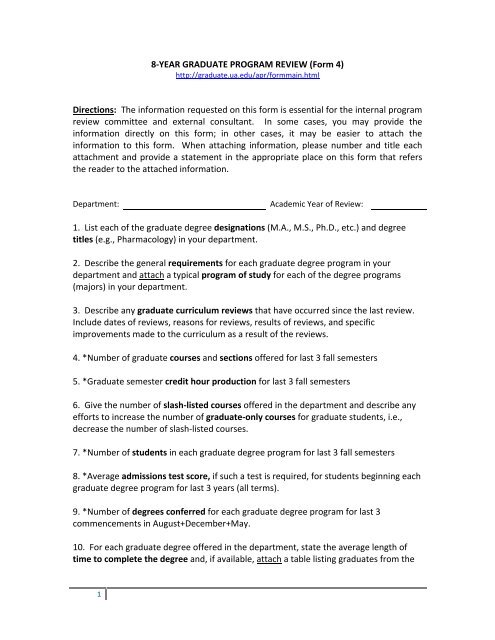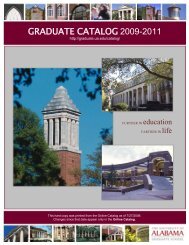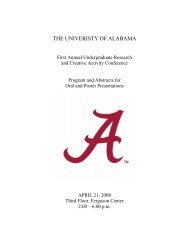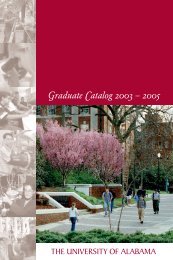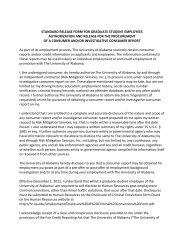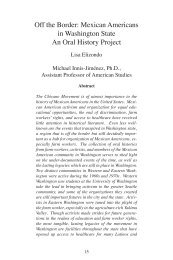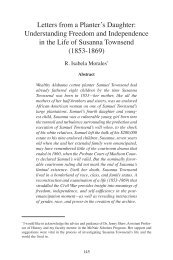8-YEAR GRADUATE PROGRAM REVIEW (Form 4) Directions: The ...
8-YEAR GRADUATE PROGRAM REVIEW (Form 4) Directions: The ...
8-YEAR GRADUATE PROGRAM REVIEW (Form 4) Directions: The ...
Create successful ePaper yourself
Turn your PDF publications into a flip-book with our unique Google optimized e-Paper software.
8‐<strong>YEAR</strong> <strong>GRADUATE</strong> <strong>PROGRAM</strong> <strong>REVIEW</strong> (<strong>Form</strong> 4)<br />
http://graduate.ua.edu/apr/formmain.html<br />
<strong>Directions</strong>: <strong>The</strong> information requested on this form is essential for the internal program<br />
review committee and external consultant. In some cases, you may provide the<br />
information directly on this form; in other cases, it may be easier to attach the<br />
information to this form. When attaching information, please number and title each<br />
attachment and provide a statement in the appropriate place on this form that refers<br />
the reader to the attached information.<br />
Department:<br />
Academic Year of Review:<br />
1. List each of the graduate degree designations (M.A., M.S., Ph.D., etc.) and degree<br />
titles (e.g., Pharmacology) in your department.<br />
2. Describe the general requirements for each graduate degree program in your<br />
department and attach a typical program of study for each of the degree programs<br />
(majors) in your department.<br />
3. Describe any graduate curriculum reviews that have occurred since the last review.<br />
Include dates of reviews, reasons for reviews, results of reviews, and specific<br />
improvements made to the curriculum as a result of the reviews.<br />
4. *Number of graduate courses and sections offered for last 3 fall semesters<br />
5. *Graduate semester credit hour production for last 3 fall semesters<br />
6. Give the number of slash‐listed courses offered in the department and describe any<br />
efforts to increase the number of graduate‐only courses for graduate students, i.e.,<br />
decrease the number of slash‐listed courses.<br />
7. *Number of students in each graduate degree program for last 3 fall semesters<br />
8. *Average admissions test score, if such a test is required, for students beginning each<br />
graduate degree program for last 3 years (all terms).<br />
9. *Number of degrees conferred for each graduate degree program for last 3<br />
commencements in August+December+May.<br />
10. For each graduate degree offered in the department, state the average length of<br />
time to complete the degree and, if available, attach a table listing graduates from the<br />
1
last 5 years, the degree(s) each completed, and the time (years and months) taken for<br />
each to complete their respective graduate degrees.<br />
11. Indicate success of graduates in securing employment (or acceptance for additional<br />
graduate work) within and outside Alabama by attaching a list of graduates during the<br />
last 5 years and indicating where each was employed or went for additional graduate<br />
work.<br />
12. Provide any objective or subjective information you have on employers’ satisfaction<br />
with graduates of your graduate degree program(s).<br />
13. Describe procedures for regularly monitoring academic progress of graduate<br />
students.<br />
14. Indicate sources of external funding and dollar amounts for (a) research, (b) service<br />
or teaching contracts, and (c) training grants in the department<br />
15. If you have a doctoral program included in the National Research Council rankings<br />
of research‐doctorate programs, describe what is being done to increase its standing.<br />
16. List the sources of financial assistance in the department, the number of graduate<br />
students currently supported by each source, and the type of assistantships available<br />
(teaching, research, other); also list current scholarships, fellowships, grants, contracts,<br />
etc.<br />
Please be sure to include, by year for each of the last 5 years, the number of<br />
Graduate Council Fellowships<br />
National Alumni Association (license tag) Fellowships<br />
McNair Fellows<br />
SREB Fellows<br />
Future Faculty Fellows<br />
Total awarded to your students from the Graduate School’s Research and Travel<br />
Fund<br />
Any Fellowship Enhancement Program support since the program began in 2010‐<br />
2011.<br />
GCF<br />
NAA<br />
McNair<br />
SREB<br />
FFF<br />
1 year ago 2 years ago 3 years ago 4 years ago 5 years ago<br />
2
Rsch/Tvl<br />
FEP<br />
17. Briefly describe the criteria and process for awarding assistantships. If there is a<br />
maximum time for a student to have an assistantship, please indicate.<br />
18. If the department has any off‐campus and/or distance learning graduate courses,<br />
describe staffing and procedures to assure that the quality of such courses is<br />
comparable to the quality of on‐campus courses.<br />
19. How and how often is the quality of faculty teaching of graduate courses evaluated<br />
in the department<br />
20. Who is the department’s designated GTA Training Coordinator (SACS requires<br />
that all GTAs must have “direct supervision by a faculty member experienced in the<br />
teaching discipline.”)<br />
21. Does each new GTA receive:<br />
(a) a letter of appointment that details the GTA’s duties<br />
(b) a previous syllabus for the course(s) to be taught<br />
(c) information concerning the department’s GTA Training Coordinator<br />
(d) a departmental orientation to being a GTA, in addition to the University’s<br />
Workshop for New Graduate Teaching Assistants<br />
22. Describe the SACS‐required “planned and periodic evaluation” the department<br />
uses for assessing all GTAs. Also, indicate where copies of those periodic evaluations<br />
are maintained and for how long. Attach a template or a completed example, but<br />
redact information that identifies the particular student.<br />
23. Describe the SACS‐required “regular in‐service training” provided to assist GTAs in<br />
continuing to develop their teaching skills throughout their time serving as GTAs in the<br />
department.<br />
24. Does each new GRA receive:<br />
(a) a letter of appointment that details the GRA’s duties<br />
(b) orientation as a GRA<br />
25. Describe how the quality of research by graduate faculty is assessed, what rewards<br />
(in addition to merit increases and promotion/tenure) are provided as research<br />
incentives, and what is done to increase the quality/quantity of research for those not<br />
meeting expectations.<br />
3
26. <strong>The</strong> Chancellor and President are looking for opportunities for the three campuses<br />
of <strong>The</strong> University of Alabama System to work together more closely.<br />
a.) What is the feasibility of offering one or more of your graduate degree programs<br />
with UAB and/or UAH<br />
Note. Working with other institutions on an existing degree program might take a<br />
number of forms, e.g., beginning to offer a long‐standing UA program as a “cooperative”<br />
program with UA still the primary institution for program resources and administration.<br />
Alternatively, it could take the form of a “shared” program that is mutually sponsored<br />
by two or more institutions but would not be terminated if one of the institutions<br />
becomes unable to meets its obligations to the shared program.<br />
b.) What are the opportunities for collaboration in research with UAB and/or UAH<br />
*Note. Each item with an * is provided to you in a spreadsheet by the Office of<br />
Institutional Research and Assessment. After verifying the correctness of the OIRA data,<br />
you should be able to copy/paste the spreadsheet data into the appropriate places on<br />
this form.<br />
4


